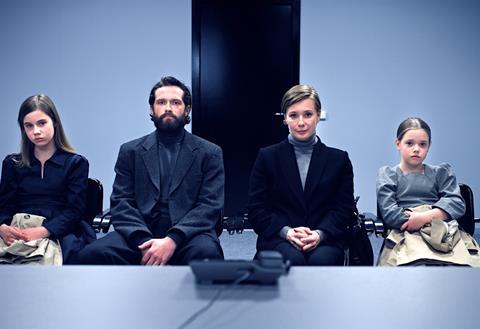A Russian family seeking asylum in Sweden face the unexpected in this unsettling drama

Dir: Alexandros Avranas. France/Germany/Sweden/Greece/Estonia/Finland. 2024. 99mins
Highlighting the phenomenon of Child Resignation Syndrome, which sees children completely withdraw into themselves in a coma-like stasis, director Alexandros Avranas has created a family drama as chilling as any horror story. An exiled family’s application for asylum in Sweden marks the start of a nightmare scenario that systematically strips them of humanity and hope. Avranas takes a restrained, clinical approach to material steeped in outrage, making Quiet Life a coolly intriguing film. Adventurous arthouse audiences should be drawn into an unsettling tale.
A coolly intriguing film
Child Resignation Syndrome has been observed in Sweden for the past quarter of a century, and seems to most readily strike down children from the former Soviet and Yugoslav countries. Gripped by the traumas of the past and fears of a future in which their parents can no longer keep them safe, the children effectively shut down, lapsing into a coma-like state.
In Quiet Life, teachers Sergei (Grigory Dobrygin) and Natalia (Chulpan Khamatova) have fled persecution in Russia with their daughters Alina (Naomi Lamp) and Katja (Miroslava Pashutina). They have made a fresh start in Sweden and are awaiting a decision on their asylum claim. Avranas makes it clear what model citizens they would be. Polite and submissive, they have all learned Swedish, the children have thrown themselves into school life and they even joke about the Swedish names they might adopt. The future seems bright. Perhaps there are clues in the production design alerting us to how false that assumption is. The safe house they occupy is devoid of character or warmth, offices are impersonal, the neutral colour palette of drab greys and beige seems designed for despondency.
Shortly after their asylum application is rejected, Katja collapses in her school playground. She is subsequently transferred to a specialist clinic with parental visits strictly controlled. Anxiety over Katja’s health is exacerbated by the need for her eye witness testimony to bolster their asylum appeal.
Quiet Life follows the family down a rabbit hole and takes a sledgehammer to the implacable face of uncaring authority figures. There are no glimmers of compassion or understanding among the representatives of the state. The family are met by suspicion and resentment, and left with little control over their lives. Avranas, a Venice Silver Lion winner for Miss Violence (2013), adds an absurdist comedic flavour of Yorgos Lanthimos to scenes at the clinic where a grim Sergei and Natalia are taught how to keep calm and stay smiling around their daughter. The unyielding, blank-faced therapists’ own endless smiles never reach their eyes. A hospital ward filled with a dozen beds containing locked down, comatose children can’t help but remind you of the patients in Awakenings (1990).
There is also something of Jessica Hausner in Avranas’ detached, coolly observant style and sparing use of music. He lets the camera linger on the actors during key moments of confrontation. Naomi Lamp is compelling as Alina, particularly when she faces a grilling from a panel seemingly intent on not believing her emotional eye witness testimony about what happened to her father. Chulpan Khamatova also delivers, Natalia struggling as a mother unable to protect and comfort her children.
The prevailing sense of callous state indifference to the family’s fate mean that the smallest acts of individual kindness radiate with warmth. The helping hand extended by clinic assistant Adriana (Eleni Roussinou) and some lyrical moments of tender family time together help fly the flag for common decency. Humanity may emerge triumphant, but in Quiet Life it is a close run thing.
Production company: Les Films Du Worso
International sales: Elle Driver sales@elledriver.eu
Producers: Sylvie Pialat, Alejandro Arenas Azorin, Benoit Quainon, Adeline Fontan Tessaur
Screenplay: Stavros Pamballis, Alexandros Avranas.
Cinematography: Olympia Mytilinaiou
Production design: Markku Patila
Editing: Dounia Sichov
Music: Tuomas Kantelinen
Main cast: Chulpan Khamatova, Grigory Dobrygin, Naomi Lamp, Miroslava Pashutina, Eleni Roussinou























